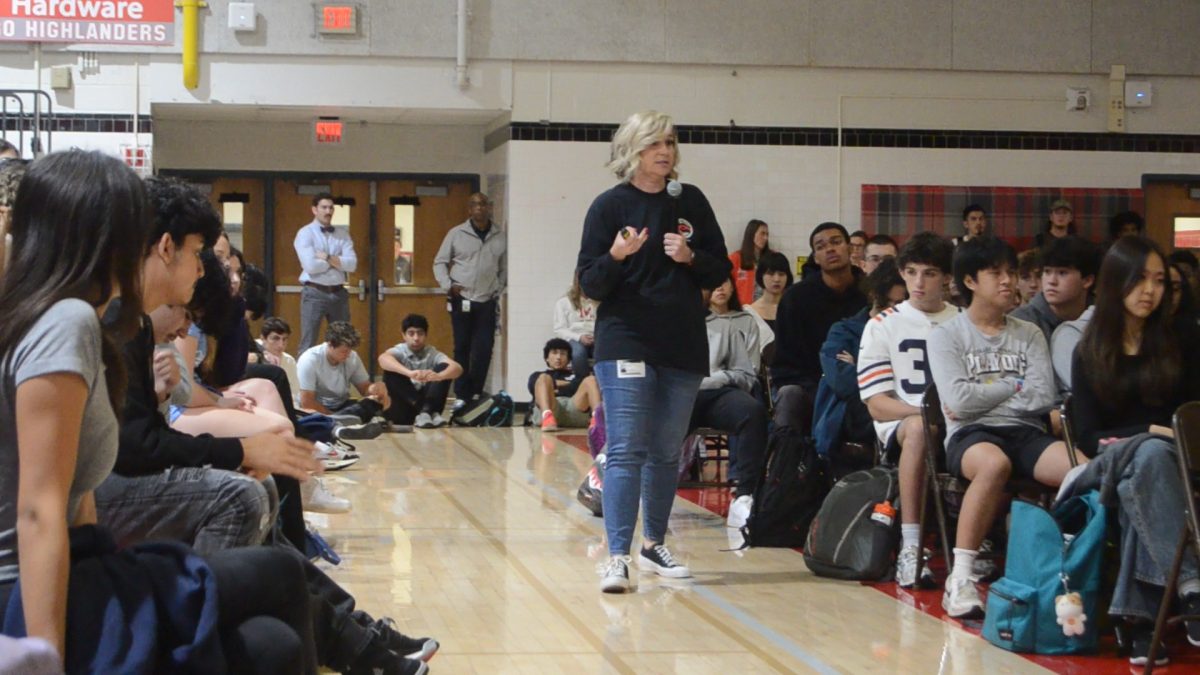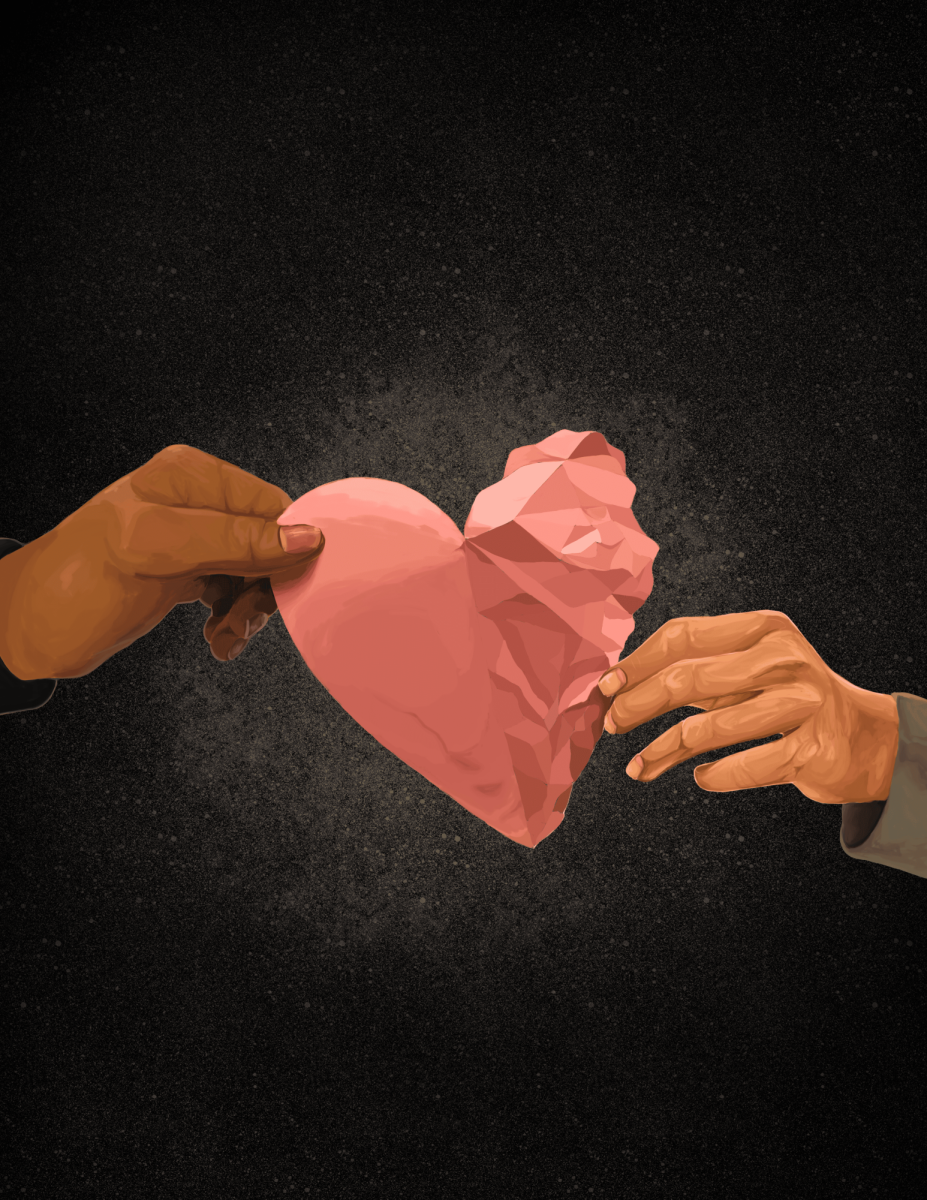After 19 year old Adam Oakes passed away at a fraternity initiation event in 2021, the Love Like Adam Foundation made it their mission to honor Oakes’ legacy through spreading hazing awareness to high schools, colleges and even the Virginia state government. On Wednesday, Oct. 2, Love Like Adam visited an assembly of juniors and seniors to make McLean the next stepping stone in dismantling the institutionalized practice of hazing.
“Adam loved everybody—he had a huge heart and he was always giving to others so we thought ‘Love Like Adam’ and not ‘Live Like Adam’ really showcased him as a person,” said Courtney White, Oakes’ cousin and Love Like Adam founder. “After he passed, I made it my goal to learn as much as I could about hazing and become more credible on the topic while at the same time investigating Adam’s case so that I can use what happened with him as a source to teach kids.”
Hazing is the activity in which a person is degraded and abused in order to join a group or organization. For Oakes, it was drinking a handle of Jack Daniels whiskey, making his blood alcohol concentration (BAC) rise to 0.41%. According to the National Library of Medicine, a BAC above 0.40% puts individuals at serious risk of coma or death.
“Adam went to a big-little night to find out who his big brother was and found out his big brother was Andrew White. Andrew handed him a drink that was already made, they chugged it together and then Andrew gave him the rest of the bottle,” White said. “At that point, the alcohol had taken over Adam so they laid him on the ground and [left him].”
White and Oakes’s father, Eric Oakes, encouraged students to avoid participating in hazing and call for help if there was someone in critical condition. Messages in the Delta Chi online chat room reveal that when Oakes passed out, the fraternity members opted to make hateful comments about his size instead of seeking help. According to Love Like Adam, had one of the fraternity members called 911, Oakes would still be alive today.
“There were so many things Adam didn’t have. He didn’t have the education, he didn’t know what [hazing] was, he didn’t know all the infraction that this fraternity would have. What we’re doing is empowering you all to have a voice in the change,” White said. “It will be four years in February that we’ve been doing this and every year we’re meeting and connecting with more kids. The more kids know what [hazing] is, especially in high school, it’s so powerful because you’re getting it now but then you’ll get the hazing prevention education again when you’re a freshman. The more you hear it, the more you retain, the more that you start to be the change.”
At the assembly, Love Like Adam played the Emmy award-winning documentary created in memory of Oakes: “Death of a Pledge: The Adam Oakes Story.” The documentary featured interviews of the convicted Delta Chi fraternity members at Virginia Commonwealth University (VCU), with some members being graduates of FCPS. Since Oakes’s death, the Delta Chi fraternity has been permanently banned from the VCU campus.
Virginia is a “hazing hotspot” in the U.S., with 19 deaths directly caused by hazing since 2010. The efforts of Love Like Adam have led to the introduction of several bills in the Virginia legislature over the past few years, some of which have been signed by Gov. Glenn Youngkin into law. In 2022, HB 525/SB 439, better known as Adam’s Law, was passed. It created several new requirements for universities and colleges, including mandating hazing prevention training for all student organizations, creating disciplinary immunity for those who report the hazing and implementing stringent requirements for the reporting of hazing incidents to the authorities.
Legislators have also attempted to make hazing that causes death or serious injury a Class 5 felony, which would carry a potential maximum sentence of ten years, but such efforts failed in the legislature.
“The law is weak—it’s a Class 1 misdemeanor. In Adam’s case, it should be a felony because of the severity of what happened,” White said.
In contrast to a Class 5 felony, the maximum allowable sentence for a Class 1 misdemeanor is one year.
Starting next year, high schools in Virginia will incorporate hazing education for freshmen and sophomores as required by HB 719/SB 379, which passed this year. Students will be provided with education on hazing with research-based learning material, learning about examples of hazing and the dangers and consequences that come with it.
“We know from research that one in ten students didn’t even know what hazing was or that they had been hazed,” said Del. Atoosa Reaser when presenting the bill. “We’ve had 50 college students die from hazing since the year 2000.”
However, individual hazing cases such as Oakes’s face barriers when taking legal action. The Oakes family is still in the process of suing the 11 fraternity members involved with the hazing event.
“It’s really difficult for prosecutors to take hazing cases and go full trial with them. It is hard for them to prove hazing is intentional. They have evidence from the hazers, but because of that code of silence in organizations that are hazing, not many people will talk,” White said. “We actually do training for police for what to look for in hazing cases and who to interview first so that they can get the pledges before they get the members [because] the pledgers don’t have the loyalty that the rest of the members have. We’re teaching police, students and higher education, so our next step will be prosecutors.”
McLean students now have a better understanding of hazing before they decide to go to college.
“I learned that hazing is a lot more widespread than I originally thought and Virginia is one of the worst states for hazing which is scary,” junior Rahm Fishman said. “It makes me feel a little bit uncomfortable knowing that a bunch of the [convicted] hazers were from FCPS.”
With Love Like Adam continuing to push for policies against hazing, the next generation of students is responsible for spreading awareness, helping victims and ending the traditional cycle of hazing.
“Hazing is passed down generation to generation. ‘I went through it but now I’ll put you through it’ is the mentality that keeps repeating over and over. Sadly, a lot of alumni see it as one organization’s issue and not a systemic issue,” White said. “It’s not just at one organization, it’s multiple organizations. You’re basically giving power to 18, 19, 20 year old kids but telling them that they’re men and telling them that they’re women.”
















